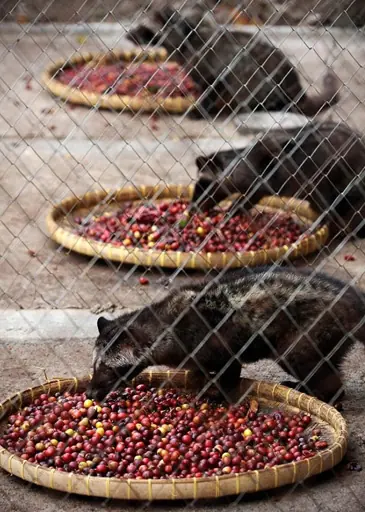Coffee is not just a drink, it is a lifestyle. Millions of people around the world start their day with a cup of aromatic and tonic coffee. The coffee ritual is an integral part of our culture. But what if I told you that there is a coffee that costs $500 per kilogram and is made from beans that pass through the stomach of an animal? Yes, I'm talking about the most expensive coffee in the world - Luwak.
The history of Luwak began in Indonesia. In the wild, palm civets, relatives of mongooses, feed on overripe fruits of the coffee tree. During the digestion process of the animal, the shell of the grains dissolves, and the grains pass through the stomach and come out along with other waste. They are then collected and processed to produce coffee.
Coffee made from beans that have passed through the stomach of an animal is called Luwak. This drink became so popular that palm civet farms began to open on the Indonesian islands. Animals are kept for the sole purpose of producing as much fermented coffee as possible for humans.
But why are people willing to pay so much for this coffee? Coffee made from Luwak beans has a special taste and aroma. The civet's stomach removes the protein responsible for bitterness from grains. As a result, the coffee acquires a delicate caramel taste. A cup of this drink costs $50, and a kilogram will cost $500.
But it's not that simple. Many people give up Luwak after learning how it is produced. After all, this is coffee that has passed through the stomach of an animal. Many people find it unaesthetic and disgusting.
There are also concerns about animals. Some farms keep civets in terrible conditions and force them to eat only coffee beans. This causes stress and can lead to poor animal health. Therefore, if you decide to try Luwak coffee beans, you should pay attention to the origin of the product and only choose producers who care about animal welfare.
So is it worth drinking the most expensive coffee in the world? The decision is yours. If you are a lover of unusual tastes and are willing to pay a lot of money for an exclusive product, then why not? However, if you believe that coffee should be produced without harming animals and prefer to avoid products that have passed through the stomach of an animal, then you may want to avoid Luwak. Either way, the choice is yours, and it's important to remember that the most expensive product is not always the best. There are many other coffee options that can suit your taste preferences without harming animals or your wallet.
While the idea of patenting a new type of coffee made from coffee beans half-digested by a panda sounds interesting, don't forget about the animals and their welfare. In addition, it is not certain that such coffee will be of high quality and taste to justify its cost. In any case, we must remember that our choices in life and consumption must be based on conscious decisions and care for our planet and its inhabitants.



